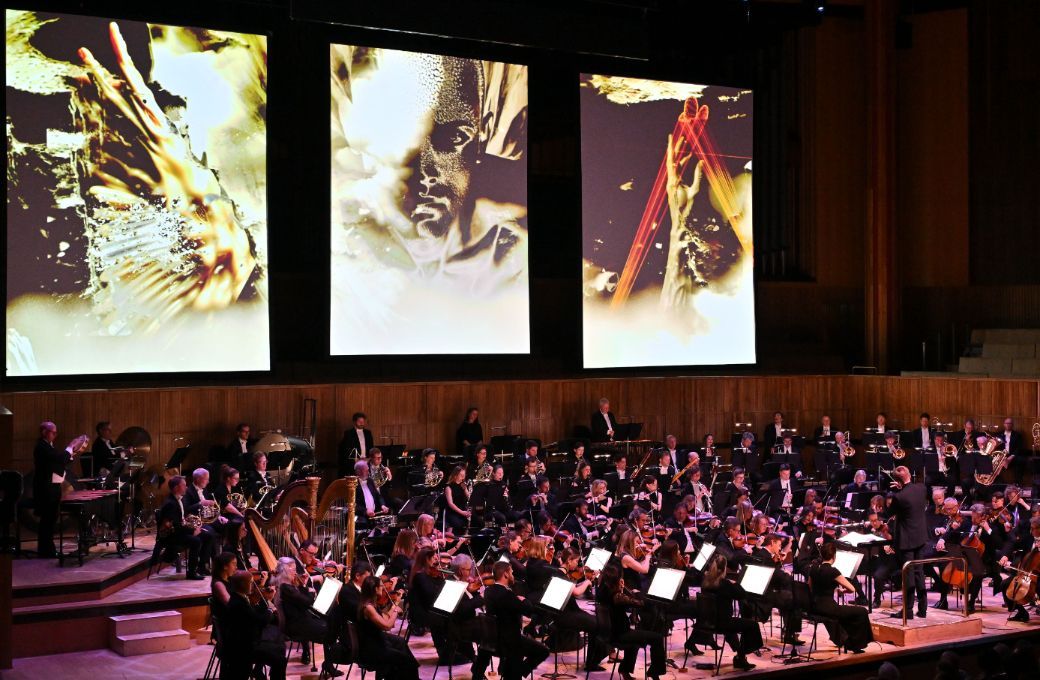“How much will it change your perception of the piece?” asked Vasily Petrenko, challenging the audience ahead of this “visual imagining” of Shostakovich’s Leningrad Symphony. That, Vasily, is a very good question. This Royal Philharmonic Orchestra concert featured the second Shostakovich symphony to be given the big screen treatment within four days, part of the Southbank Centre’s Multitudes festival where their resident orchestras entertain genre-crossing twists. That it worked so much better than the Philharmonia’s Tenth is down to the sensitive artistic vision of Kirill Serebrennikov.

Having served two years’ house arrest in Putin’s Russia, the dissident film director (now based in Berlin) understands siege mentality. You’d think matching him to Shostakovich’s gargantuan wartime symphony, a work not just about the struggle against the Nazis but against any totalitarian regime, would result in a biting indictment of present-day politics. Wrong. Instead, Serebrennikov and video artist Ilya Shagalov offer a beautiful reflection on the work that really is perception-altering.
Three giant screens above the stage display images ranging from open blue skies and towering mountains to missiles launched from battleships down to the microscopic. During the lengthy first movement, the mythological flight of Icarus is referenced, angel wings burning up in a fireball.
Whereas William Kentridge’s film screened over the Philharmonia’s Tenth interprets the music and binds it to Shostakovich’s biography, Serebrennikov uses video to enhance what we hear rather than to depict the music itself. And those visuals make such a difference to how we listen. Take the third movement Adagio, a tragic lament. After the solemn woodwind introduction, the strings play a D major chord. Accompanied by images of a burning forest, this chord sears the soul – I felt tears welling up – yet when that same chord returns at the end of the movement, it is transfigured by what we see: the outline of two bodies floating serenely, hands touching, a moment of bliss.
Similarly, the symphony’s finale ends in a mood of C major defiance, and yet the imagery of flowers blooming, bursting into a blaze of colour, feels so uplifting that, yes, it does change the way one feels about this music, if only momentarily.
The other benefit to Serebrennikov and Shaglov’s approach was that the RPO and Shostakovich were never relegated to a soundtrack. I was much more focused on the musical interpretation here, not difficult when the performance was so gripping. In his long tenure at the Royal Liverpool Philharmonic, Petrenko turned it into the UK’s best Russian orchestra. Is he doing the same here? The brass playing was hair-raising while in the first movement’s oft-repeated march – a deliberately banal tune – the woodwinds relished their Boléro-like turn in the spotlight. Under Petrenko’s fluid beat, there was a real sheen to the strings, the cellos especially warm in the second movement, which Shostakovich described as a "very lyrical Scherzo".
Did a festival wanting to draw in a new crowd via multimedia actually need the first half to this concert? Possibly not but this programme was also part of the RPO’s ‘Lights in the Dark’ series and, like the Leningrad Symphony, both works speak of defiance in the face of wartime threat. Baritone Roderick Williams, singing with such great diction that surtitles were superfluous, excelled in Kurt Weill’s high-lying Four Walt Whitman Songs, his seamless legato in Oh Captain! My Captain! especially poignant. And the RPO’s rendition of Finlandia that opened proceedings has rarely been more stirring, the brass positively lethal. The Petrenko Effect continues.


